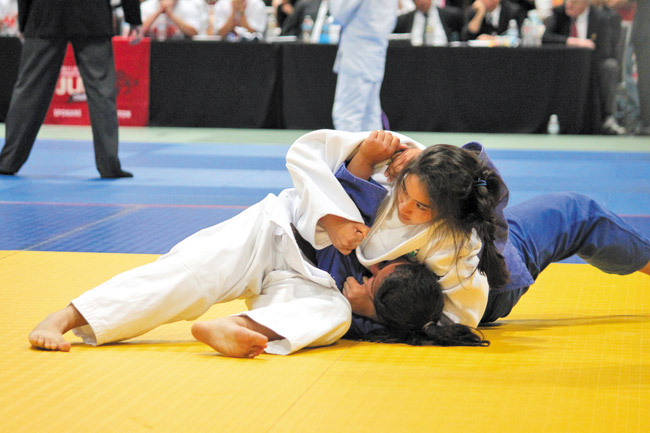Mililani Judo Club: Home Of Champions

Shaena Peralto controls an opponent at the 2014 Junior National Championship, July 4 at the Blaisdell Arena
PHOTO FROM MILILANI JUDO CLUB
At first glance it doesn’t appear very formidable — a judo class taught to kids, teens and adults in the same space that offers senior aerobics and keiki gymnastics. Cobra Kai didn’t share training space, how could the Mililani Judo Club do so and still turn out champions? Well, they are.
At the July 4 Junior National Championships held at the Blaisdell Arena, 17-year-old Shaena Peralto placed first, winning her third straight national title. She was joined by senior national champion Kyle Shiraki and second-place finisher Jensen Hernandez, both instructors at the Mililani YMCA dojo.
Peralto is special. The home-schooled teenager began studying judo at the age of 8, and though her talent wasn’t immediately obvious, her long years of training have placed her in a position to perhaps join the long list of Hawaii Olympians.
“Medaling in that tournament was huge to us,” says Sanford Kaga, an assistant instructor at the club. “We were ecstatic, but with Shaena we kind of expected it. We don’t expect anything less from her any more.”
Kaga said Hawaii occupies a unique spot in judo. Much smaller than any other state where the sport is popular, the Islands boast one of the country’s top development programs. Why is a matter of instruction and competition.
Mililani’s head instructor is sensei Mark Muranaka. A rokudan (sixth-degree black belt) was a gold medalist for three consecutive years at the Senior National Championships, beginning in 2001. Muranaka also teaches at other dojos in the area. In fact, Mililani has a staff of teachers who rotate among other area schools, including Mililani Seidokan and Mililani Hongwanji, sharing their experience with generations of participants. When tournament times comes around, students from those dojos and at the Kaimuki YMCA are free to train at the other schools. This allows judoka (judo practitioners) to practice up to six days a week.
Unlike any other state, Hawaii hosts monthly tournaments that allow competitors to constantly improve against students from other schools. At the June tournament, 170 aspiring champions took to the mat. Most months, the number is closer to 200.
“We have that every month,” says Kaga. “They don’t have that in California, so they have to compete against themselves. That is a big advantage for our students.”
Mililani Judo Club was started by sensei Yasuyuki Sakabe at Wahiawa YMCA in the 1960s. When that branch closed in the 1980s, all programs, including judo, moved to the newly built Mililani YMCA. Having the YMCA as a home base has been a tremendous positive for the club, said Kaga, a second-degree black belt.
The YMCA provides insurance for the students, maintains the building and administers costs, which makes things easier for the instructors who volunteer their time.
“The YMCA has done a lot for us. We don’t have to worry about the business or maintenance,” says Kaga. “When things come that we need, we go to them and they have been very fulfilling.”
Providing space and administration to the club does more than benefit the dojo. It also helps the YMCA fulfill its commitment to supporting healthy activities to community members.
For home-schooled children such as Peralto, judo fulfills the athletic requirement for graduation. But is judo a sport, or a martial art of a mix of the two? The best answer seems to be, yes.
Judo was developed from an earlier form of jujitsu. Meaning “gentle way,” judo is not designed to purposely punish an attacker, but to use their energy to deflect or pin the opponent.
“It depends on how you emphasize your techniques,” says Kaga of the differences between the sport and the martial art. “Judo came from jujitsu, not the jujitsu people practice today. The founder of judo (Jigoro Kano) took some things from jujitsu and took out the ones considered to be too dangerous, made some rules for it and created a sport.”
Mililani Judo Club has openings for new members. Membership is $20 for YMCA members and $26 for non-members. Practices are one hour long and begin at 6:45 for beginner and intermediate judoka each Tuesday and Thursday evening. Most of the students are youngsters and teens, with more mature students taking part after their kids got involved.
For more information about classes, fees and other programs, call Mililani YMCA at 625-1040. smurray@midweek.com





